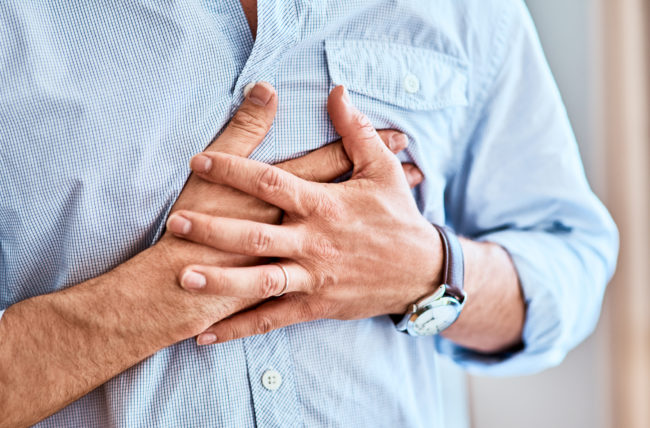Breathing difficulty describes a sensation of moderate to severe discomfort when breathing due to an inability to draw complete breaths. This problem can happen suddenly or develop gradually. While it is perfectly normal for most people to feel short of breath during and after vigorous physical activity, prolonged breathing difficulty may signal underlying issues.

Breathlessness – medically referred to as dyspnea – may occur due to many medical and non-medical reasons. Depending on the frequency and intensity of your dyspnea episodes, you may wish to consult a licensed medical professional for proper diagnosis and treatment. Here are some of the most common causes of breathing problems.
Allergies
According to the CDC (Centers for Disease Control and Prevention), allergens such as animal dander, mold and pollen can trigger asthma-like symptoms that make drawing complete breaths very difficult. In more extreme allergic reactions to allergens like insect stings, specific medications or certain foods, people may experience anaphylaxis.
Anaphylactic reactions happen when the body’s immune system overreacts to specific allergens by producing chemicals that trigger allergy symptoms, e.g., swollen airways, hence preventing normal breathing. These immune system responses can be life-threatening if left unchecked.
Anemia
Mayo Clinic experts suggest that iron deficiency is the primary cause of the most common kind of anemia. An iron deficiency can make breathing much harder since our bodies need iron to make hemoglobin. Hemoglobin is a special, iron-rich protein used by the red blood cells to transport oxygen from the lungs to other parts of the body.
Essentially, people suffering from iron-deficiency anemia experience a mismatch in oxygen demand and supply capacity. According to the NHLBI (National Heart, Lung and Blood Institute), when the body lacks an adequate supply of oxygen-rich blood, symptoms such as irregular heartbeats, dizziness and shortness of breath may occur.
The Flu and The Common Cold
These viral infections are quite common and affect most people several times throughout their lives, particularly during the cold seasons. They reduce or even prevent regular airflow to the lungs by causing the nasal passageways to swell. Covid-19, caused by the novel coronavirus (SARS-CoV-2), belongs to the same family of viruses and can cause breathlessness as well.
Other symptoms that could make breathing more challenging when dealing with the flu or the common cold include:
- Sinusitis (inflammation of the sinus cavities surrounding the nasal passages)
- A stuffy nose
- Mucus oversecretion in the airways
Most cases of the flu or the common cold are treatable at home. The accompanying symptoms typically subside as the illness resolves.
Cancer Tumors
Developing cancer tumors in the lungs or the throat can block the airways and make breathing, particularly inhaling deeply, very difficult. Additionally, treatments involving radiotherapy, surgery to remove parts of the lung and cancer drugs like bleomycin and interleukin 2 can cause shortness of breath.
Asthma
Asthma is a common chronic condition that causes inflammation and swelling in the bronchial tubes. Like other chronic diseases, asthma episodes vary depending on exposure to specific triggers such as dust, pollen, emotional stress, viruses and exercise. During asthma attacks, airways leading to the lungs swell so much that the surrounding muscles tighten, and inhaling and exhaling become difficult.
In his blog What Causes Breathing Problems, Dr.Rubinstein of the Hudson Valley Sinus Center mentions that asthma and chronic sinusitis often occur concurrently. While chronic sinusitis can worsen the intensity of asthma and breathlessness, treating it can subside breathing difficulties and asthma symptoms. The methods used to treat chronic sinusitis viral depending on the cause of infection and duration. For instance, while antibiotics may suffice for some people, others require minimally invasive surgery in the form of balloon sinuplasty.
Obesity
According to the NHLBI, excess fat around the abdomen, chest or neck increases the difficulty of taking deep breaths. This causes obesity hypoventilation syndrome, a breathing disorder common among obese people or people who do not regularly engage in vigorous physical activity. Such people often feel short of breath after brief periods of exertion.
Sleep Apnea
Sleep apnea is a sleeping disorder that makes it difficult to breathe during sleep. Normal breathing slows down or stops for brief intervals at a time throughout a sleep cycle. Sleep apnea is potentially dangerous since breathing restarts quickly, making it difficult to know if it ever happened.
While snoring is common among people with sleep apnea, a report published in the Journal of Cardiology shows that extreme cases can trigger acute shortness of breath and a sudden gasp for air. The medical terminology for this symptom is paroxysmal nocturnal dyspnea. Besides signaling sleep apnea, this symptom could also indicate other conditions such as heart failure.
High Altitude
Generally, oxygen levels decrease as altitude increases. People accustomed to living below or near sea level may suddenly feel lightheaded and short of breath when they visit high altitude areas. This feeling can last for hours or days, depending on how soon their bodies become acclimated.
Poor Air Quality
Poor air quality, whether indoor or outdoor, can cause breathing difficulties. The Respiratory Health Association supports that inhaling polluted air can irritate the airways and set off symptoms, including breathing difficulty and asthma attacks.
Extreme Weather Conditions
Exposure to abnormal temperatures, e.g., during a heatwave, forces the body to use more energy to maintain the optimal body temperature. Consequently, this makes the body to work a lot harder to draw complete breaths.
Breathlessness after Eating
Some health conditions can make breathing difficult after eating. For instance, the COPD Foundation confirms that people suffering from COPD (Chronic Obstructive Pulmonary Disease) are likely to experience shortness of breath right after a heavy meal as the food pushes against the diaphragm. COPD is a family of progressive lung diseases, with the most common being chronic bronchitis and emphysema.
Acid reflux can also cause breathlessness and chronic coughing. This happens when stomach acid moves up the epithelium (esophageal lining), causing irritation and inspiratory breathing problems.